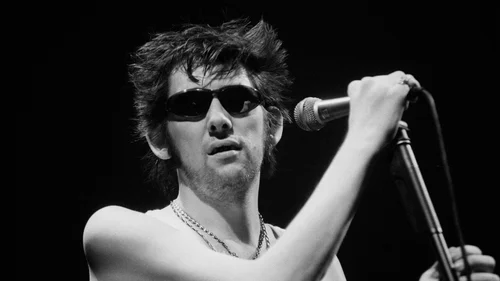By Finn McKenna
The year 2023 will be remembered as one of great loss for Irish cultural icons. Sinéad O’Connor and Christy Dignam were losses that were deeply felt in Irish society, and there’s no doubt that the passing of Shane MacGowan represents another huge, heartfelt loss for many Irish working-class people and fans across the world.
Shane MacGowan was born in 1957 and spent his early childhood years in Tipperary, which greatly impacted him. His grandmother’s house was an environment immersed with the memory and tradition of the struggle against British colonial rule. His early years were shaped by stories of that struggle, including through the lyrics of ballads, as music was a constant presence.
As a child, he recounted one trip to the seaside that would greatly affect his thinking; while playing in sand dunes he accidentally unearthed famine skulls that had been buried for over 100 years. He recounted this experience in the documentary Crock of Gold, and it brought home to him the horrors of British capitalist oppression in Ireland. Famine victims in desperation sought food in coastal areas, many perishing in this pursuit.
A great wound pierced his psyche in early childhood when he was uprooted from his childhood home and brought to live in England with his parents. He suffered serious depression from this dislocation as a young boy; his bedridden state speaking to the alienation that he experienced upon arrival in England.
As a precocious youth, MacGowan showed remarkable signs of hyper-intelligence in school. He was a voracious reader since childhood. He devoured literature, from the existentialist Dostoevsky to the dialectical Hegel and the revolutionary Marx. Such influences added to his voice and sensitive perspective that millions of his fans identified with.
While in school as a young teenager, he was discriminated against for being Irish. In the days following Bloody Sunday, he tried to speak about the crimes of the paratroopers to his classmates, only to be met with a collective beating from them.
The awareness and experience of oppression made a rebel of Shane MacGowan; a hatred of authority and the establishment. His profound alienation from the British status quo pushed him in the direction of drug and alcohol abuse in his adolescence, culminating in his institutionalisation in a psychiatric unit. Upon release, he was at the end of his tether. Accidentally, thankfully, he came upon posters promoting Sex Pistols concerts. He stated that punk music saved his life, and several of the early Sex Pistols music videos feature a young Shane MacGowan thrashing around.
MacGowan synthesised his experience of Irishness in Britain with the music of the punk wave, to ultimately bring into existence his band that is so revered to this day: The Pogues. The airs and melodies that he was brought up on in early childhood were now infused with the ‘póg mo thóin’ punk ethos.
Tabloids and other parasites have depicted Shane MacGowan through the years as an alcoholic and addict before anything else. This crass and offensive image of MacGowan discounted his abilities as a musician and his deep sensitivity as a remarkable human being. Shane MacGowan’s lyrics contain a literary brilliance that deserves to be recognised in the canon of the great Irish writers who preceded him, namely Joyce, Flann O’Brien, Beckett, Edna O’Brien, Behan, and so on.
A child of the Irish diaspora, he was able to capture the experiences of the Irish outside of Ireland in his lyricism. Those who sailed away to break free from the chains of poverty, he championed. Those who were persecuted by the British state, such as the Guildford Four and the Birmingham Six, he defended. He fearlessly put the British ruling class in the dock with his art – shining a light on the crimes of the Empire, and stood by his principles at a time when the Irish suffered oppression and injustice.
The pinnacle of MacGowan’s career was arguably throughout the 1980s, as The Pogues invented something incredibly unique – London Irish punk, and MacGowan was one of its great irreverent leaders.
Shane MacGowan did have his battles with addiction and substance abuse, inflicting serious harm on himself, of that there is no doubt. And he was flawed in many ways. But the crude depiction of him as a one-dimensional caricature should be rejected. His legacy should be understood in terms of the sensitive way that he experienced life – how he saw it, described it, and artistically hammered it when necessary.
Shane MacGowan’s passing is a loss to many of us. His was a voice of the dispossessed, shaped by a hatred of oppression and injustice. In death, may a new generation discover him – and not just the timeless classic ‘Fairytale of New York’. MacGowan’s life was that of an underdog, as many Irish people in Britain were at the time. It’s also worth remembering the past sufferings of the Irish diaspora in the context of an emboldening far-right whipping up anti-immigrant hatred in this country. Shane MacGowan stood with the oppressed, the downtrodden and the working class, and was a great symbol not just of Irish culture, but the fusion of cultures in all its power and beauty.












